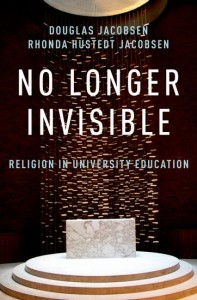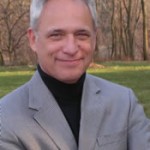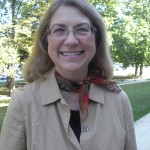No Longer Invisible: Religion in Higher Education
 On November 7th, Vanderbilt welcomed Douglas and Rhonda Jacobsen to campus for a rare opportunity to gain a new perspective on the many ways religion and spirituality bolster the mission of the university, especially as it pertains to the students we mutually serve. Douglas “Jake” Jacobsen and Rhonda Hustedt Jacobsen have been married for more than three decades, and both serve as professors at Messiah College. Douglas is distinguished professor of church history and theology. Rhonda is professor of psychology and director of faculty development. Together they have co-authored three books: Scholarship and Christian Faith: Enlarging the Conversation (2004), The American University in a Postsecular Age (2008), and No Longer Invisible: Religion in University Education (2012). Additionally, they serve as co-directors of the Religion in the Academy (RITA) project, which “focuses on the many ways that religion and spirituality (broadly construed) can enhance learning at colleges and universities.”
On November 7th, Vanderbilt welcomed Douglas and Rhonda Jacobsen to campus for a rare opportunity to gain a new perspective on the many ways religion and spirituality bolster the mission of the university, especially as it pertains to the students we mutually serve. Douglas “Jake” Jacobsen and Rhonda Hustedt Jacobsen have been married for more than three decades, and both serve as professors at Messiah College. Douglas is distinguished professor of church history and theology. Rhonda is professor of psychology and director of faculty development. Together they have co-authored three books: Scholarship and Christian Faith: Enlarging the Conversation (2004), The American University in a Postsecular Age (2008), and No Longer Invisible: Religion in University Education (2012). Additionally, they serve as co-directors of the Religion in the Academy (RITA) project, which “focuses on the many ways that religion and spirituality (broadly construed) can enhance learning at colleges and universities.”
–

 Drawing on conversations with hundreds of professors, co-curricular educators, administrators, and students from institutions spanning the entire spectrum of American colleges and universities, the Jacobsens illustrate how religion is constructively intertwined with the work of higher education in the twenty-first century. No Longer Invisible documents how, after decades when religion was marginalized, colleges and universities are re-engaging matters of faith-an educational development that is both positive and necessary.
Drawing on conversations with hundreds of professors, co-curricular educators, administrators, and students from institutions spanning the entire spectrum of American colleges and universities, the Jacobsens illustrate how religion is constructively intertwined with the work of higher education in the twenty-first century. No Longer Invisible documents how, after decades when religion was marginalized, colleges and universities are re-engaging matters of faith-an educational development that is both positive and necessary.
Vanderbilt was please to welcome the Jacobsens for a professional development session with student affairs professionals to encourage interfaith understanding and grasp the role that religion plays on campus, while also understanding the differing approaches to fostering and developing religious life on college campuses. Drawing upon expensive research and personal interviews at campuses across the country, the Jacobsens explored the different models of religious life and some of the possible reasons for the changes we see in student life today.
In addition, the Jacobsens were hosted for a dinner at the Dean of the Commons residence with Dean Frank Wcislo and around 20 others, mostly first year students, for a personal discussion about their work. Also partnering with Belmont University, the Jacobsens were treated on both campuses and we all gained much from their insights and experiences.